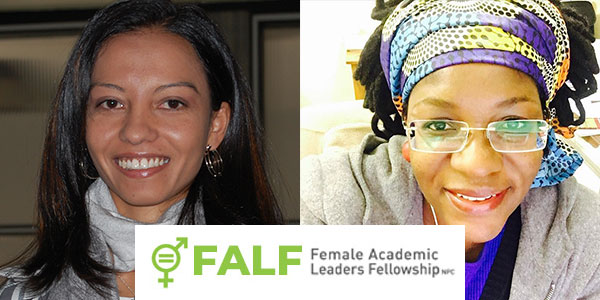Wits strives for transformation in academic leadership
- Wits University
The Female Academic Leaders Fellowship (FALF) admits second cohorts.

The 2022 cohort welcomed in May is part of the University’s efforts to transform the gender and racial profile of academics at Wits University. Currently, females constitute only 15% of the 26 Vice- Chancellors in the country, out of 30 Deputy Vice-Chancellors only 12 are women and less than 5% of Professors are black females, according to a national reports. One of the cornerstones of FALF is the empowerment of black and coloured South African female academic scholars.
FALF is making strides in correcting this picture, which has bearings on the production of knowledge, and the transformation agenda of the university and South Africa. The ultimate goal is to achieve representation in the professoriate and the higher echelons of university leadership.
The second cohort comprises of 19 academics from a range of fields (list below) adding to the 30 academics welcomed in 2021.
In its second year running, the programme has seen the first cohort rise in their careers and academic journeys through the provision of funding and mentorship in order to remove the barriers facing black and coloured females in academia.
Former cohort of the FALF programme and Associate Professor Nicole De Wet-Billings has been awarded a fellowship at the Institute for Advanced Studies in the Humanities at the University of Edinburgh. De Wet is a Lecturer in Demography and Population Studies and this opportunity will contribute to her international profile and expand spaces for African scholarship in the knowledge economy.
Wits Chancellor, leading businesswoman and catalyst of FALF, Dr Judy Dlamini was among the champions at the event to welcome the 2022 cohort.
“The first cohorts of the programme has done well and has set the bar very high,” says Dlamini.
She, however, says there is more work to be done in the coming years. “One group cannot save us from the complexities of our world but collectively we can work together,” says Dlamini.
Dr Ida Risenga, lecturer in the School of Animal, Plant and Environmental Sciences and a 2022 cohorts fellow is elated to join the programme. She conducts research in botany, cell biology, medicinal plants and phytochemistry. She is involved in a project examining the effects of climate change on medicinal plants.
Risenga wants to use the fellowship to advance her research work and nurture young people in the field. She is determined to grow this space.
“In South Africa, there is a small population of women within the medicinal plant science research field. Therefore, it is essential to create more opportunities for women in this field of research because they can offer a variety of talents and make significant contributions on the adaptation strategies in increasing resilience against the impacts of current and projected future climatic conditions,” says Risenga.
Alongside this is the desire to preserve our natural heritage.
“Medicinal plants are valuable to human livelihood worldwide. Climate change may affect the accessibility and productivity of medicinal plants, as well as the phytochemical content in the surviving populations. Consequently, their pharmaceutical properties may be negatively impacted. Therefore, conducting research on the potential effects of climate change on medicinal plants is significant in order to have better understanding of the true impacts,” Risenga.
Academic leadership according to FALF encompasses administrative leadership and leadership in the academic discipline. Thus, supporting the target group advances diversity which, apart for changing the face of knowledge, this helps to create inclusive university and is good for students and society.
Visit the FALF website.
Related article:
Wits’ transformation agenda places focus on female leaders
Towards gender parity in academic leadership
2022 FALF Cohort
|
Ms |
Abigail |
Dreyer |
Lecturer |
School of Family Medicine |
|
Dr |
Batseba |
Mofolo-Mbokane |
Lecturer |
School of Education |
|
Dr |
Ida |
Risenga |
Lecturer |
School of Animal, Plant and Environmental Sciences |
|
Ms |
Jessica |
Foli |
Lecturer |
School of Arts |
|
Ms |
Laetitia |
Petersen |
Lecturer |
School of Human and Community Development |
|
Dr |
Lebogang |
Maseko |
Lecturer |
School of Therapeutic Sciences |
|
Dr |
Magdeline |
Stephen |
Lecturer |
School of Education |
|
Dr |
Natalie |
Benjamin-Damons |
Senior Lecturer |
School of Therapeutic Sciences |
|
Dr |
Nomfundo |
Moroe |
Senior Lecturer |
School of Human and Community Development |
|
Dr |
Ramona |
Kunene Nicolas |
Senior Lecturer |
School of Language, Literature and Media |
|
Dr |
Shüné |
Oliver |
Researcher |
Wits Research Institute For Malaria |
|
Dr |
Sivuyisiwe |
Situngu |
Lecturer |
School of Animal, Plant and Environmental Sciences |
|
Dr |
Tintswalo |
Thani |
Lecturer |
School of Education |
|
Dr |
Tsepang |
Leuta |
Senior Lecturer |
School of Architecture and Planning |
|
Dr |
Zimkhita |
Madikiza |
Lecturer |
School of Animal, Plant and Environmental Sciences |
|
Dr |
Zanele |
Zuma |
|
Gender Based Violence Fellow based at Wits |
|
Dr |
Koli |
Notshulwana |
|
Gender Based Violence Fellow, based at UJ |
